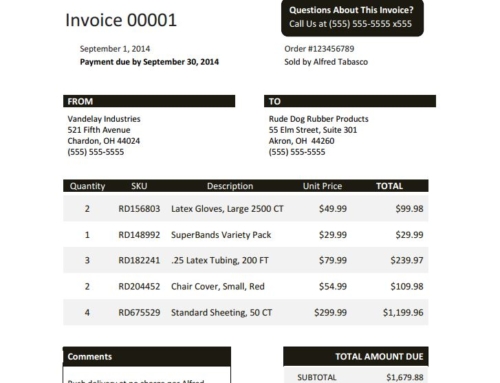On the surface, extending credit to customers seems like a no-brainer since it can be a great way to attract customers and build profitable, long-term relationships with them. But there is more to it than that. Offering credit to a customer, especially a new customer, is not something to jump into in your haste to close a deal. Here’s why:
- DSO fluctuates with revenue and other short-term changes.
- Because of its tendency to fluctuate, analyzing DSO on a period less than a year can be misleading.
- DSO takes into account only credit sales, not cash sales.
- Always look at your DSO with context with your company’s terms.
Want something better than excel? Try Lockstep Inbox, our free AR application that will show you real time aging and other AR KPIs in minutes (yes, it’s free).
As the above statistics show, there is a certain level of risk that you won’t get paid on time if you extend credit. This can cause trouble with cash flow and hinder your ability to meet the organizations financial obligations. Always consider the pros and cons of extending credit to customers before jumping into an agreement.
Benefits of Extending Credit to Customers
- Establishing trust with customers: A company who offers credit is reliable, stable, trustworthy, and mature; all of which are comforts to a potential customer.
- Increase customer loyaltyTrusting your customers and offering them credit is a great way to tell your customers how important their business is to you and how much you appreciate it. They’re helping you bolster your business, so you are providing them with the option for credit so they can be flexible with their own cash flow without scrimping on what they need. By offering credit you have made them feel as though your relationship with them is less about supply and demand and more about trust; an important part of the modern buyers vendor selection.
- Enhance your reputation: Extending credit is not something every business can afford to do. By extending credit to customers, you’re telling the customer and your competitors that you’re financially healthy with cash and access to working capital. This will boost the reputation of your organization and your product among buyers and throughout your industry.
- Gain a competitive edge: Not all businesses extend credit, so just by making this a possibility for your customers you are giving yourself an edge. Customers like to buy on credit because it gives them more control over when they pay and provides them with more flexibility and control over their cash flow. If they are between two vendors, they’re very likely to be more attracted to the vendor who gives them this flexibility.
- Enhance your reputation: Extending credit is not something every business can afford to do. By extending credit to customers, you’re telling the customer and your competitors that you’re financially healthy with cash and access to working capital. This will boost the reputation of your organization and your product among buyers and throughout your industry.
- Increase sales: For all of the reasons above, offering credit to customers is going to help you attract more prospects and close more deals. Many times customers are less concerned with price when they know they can buy now and pay later. With longer payment terms and more buying power, your customers have everything they need to purchase more from you. Additionally, the relationship you will establish with them in the process will further enhance their willingness to buy and even spread the word about your company to their peers.
Disadvantages of Extending Credit to Customers
All of these benefits of extending credit to customers seem pretty attractive- and they are. But there are some risks to extending credit that all businesses should be aware of:
- Late paying customers:Most of your customers who buy on credit will be great customers who pay you on time; but there could be a few bad eggs that bring trouble in the form of late or delinquent payment.
- The effect on cash flow: When you ask customers to pay upfront, you know exactly what your income is every month, but when you sell on credit things get a little more complicated. As we mentioned above, most customers will pay you on time, some may be a little late, and some may become serious problems; all of this will affect cash flow; perhaps in a positive way, but the chance for a negative impact is possible as well
- Enhance your reputation: Extending credit is not something every business can afford to do. By extending credit to customers, you’re telling the customer and your competitors that you’re financially healthy with cash and access to working capital. This will boost the reputation of your organization and your product among buyers and throughout your industry.
- Collection fees: If you have to turn an invoice over to a collection agency or get a lawyer involved due to lack of payment, you won’t collect everything you are owed. This combats the purpose of extending credit in the first place, but it’s only a real problem if numerous invoices end up requiring a collection agency or legal action. A well written and regularly reviewed credit policy can help you avoid this issue entirely.
- You’ll need to focus on accounts receivable management: If you start selling on credit you’re going to need to make accounts receivable management a priority. A/R management is much more than simply sending invoices and recording payment, it takes a lot of time and energy to do it right and avoid bad-debt write offs, invoice disputes, and late payments. You may even feel as though you need to hire another employee to keep up with it all. This is not always the case; there are plenty of tactics, tools, and simple process adjustments you can implement to help you quickly collect invoices without hiring any additional hands or letting money slip through the cracks.
Don’t run away scared from extending credit quite yet. While there are some significant disadvantages, there are simple ways to manage the risks of extending credit to your customers. Some of the ways you can make smarter choices about credit sales is by running credit checks, requiring new customers to fill out credit applications, developing a credit policy, and utilizing accounts receivable management best practices and tools to help make the collections processes quick and effective.




